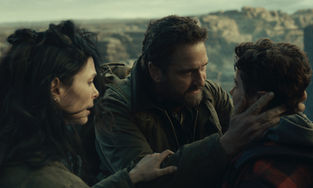'Rustin' Review: Colman Domingo Stars As The Civil Rights Activist Who Is Ready To March
- S.J.

- Nov 9, 2023
- 2 min read
Updated: Aug 13, 2024

There's no time to wait until the rust has settled because we're already checking out Rustin, one of the predictable biographical dramas hitting theatres and screens every year around this time, this one focusing on the persona and achievements of the eponymous civil rights activist Bayard Rustin in the 1960s. Colman Domingo plays the man himself, following him first from his earlier rapport with Martin Luther King Jr. (Aml Ameen), then going solo for a while, before beginning to organise a freedom march taking place in Washington D.C. in 1963 to advocate for the rights of African-Americans, which reunites him with King. Supported by fellow activists such as A. Philip Randolph (Glynn Turman), Rustin also faces resistance and vitriol from the FBI and other prominent figures like Roy Wilkins (Chris Rock) and Adam Clayton Powell Jr. (Jeffrey Wright) for being a gay man in the spotlight.
Considering this particular subgenre, it's not terribly unexpected that the movie is mostly designed to be carried by the central performance all the way through. Good news is that you most certainly do not have to worry about its quality or vigour because Domingo steps up to the plate spectacularly, invoking an essence that grabs the viewer promptly and doesn't let them go when there are fluctuations in Bayard's life, either emotionally or socially. Writers Julian Breece and Dustin Lance Black help Domingo to establish Bayard's personality rather effectively and quite often even in surprising ways as the movie doesn't really rely on a big emotional breakthrough or hero's journey; instead Domingo is allowed to display the significance of this man's contribution for those who are undervalued by the way of pure charisma and tenaciousness.
That's why it is even more unfortunate to report that the movie as a whole never reaches the same heights as its lead actor. Director George C. Wolfe struggles heavily even with somewhat simple elements such as scene structure and the dynamic range of the performances because the tone keeps slipping away from his fingers. Rustin often misses the mark when balancing different characters since the whiplash is so massive, there's notably one scene with Bayard and two men—Tom (Gus Halper) and Elias (Johnny Ramey)—in his apartment that is straight up amateurish from its blocking and shot selection to editing as the actors are all in completely different scenes. Wolfe and editor Andrew Mondshein can't make any sense of it, leaving it lingering awkwardly without rhyme or reason.
Otherwise, especially thematically and story-wise, the film is exactly what you'd expect and it'd be an easy recommendation if only it looked good. Wolfe retains his love for brown, gold and yellow shades from his previous picture but Rustin's visual aesthetic is incomprehensible. Quite likely both poorly lit by DoP Tobias Schliessler and then entirely suffocated in the colour grading process, the images sadly advise you to check out immediately, burying another important story in a tomb with other algorithmic slush. What a shame.
Smileys: Colman Domingo
Frowneys: Colouring, tone
How do you plan a March? If I May ask?










